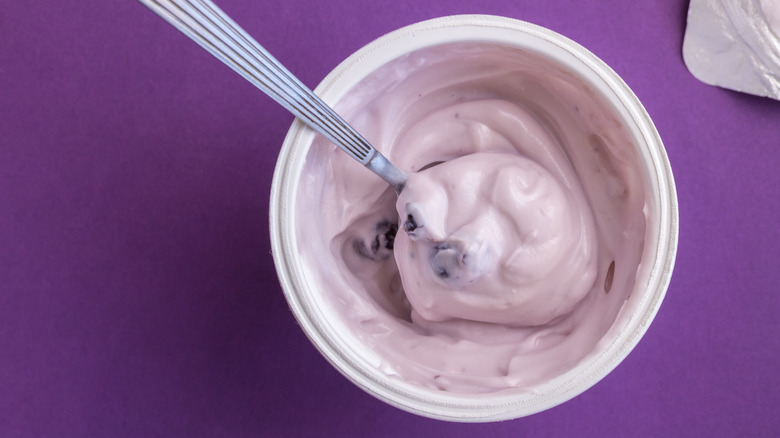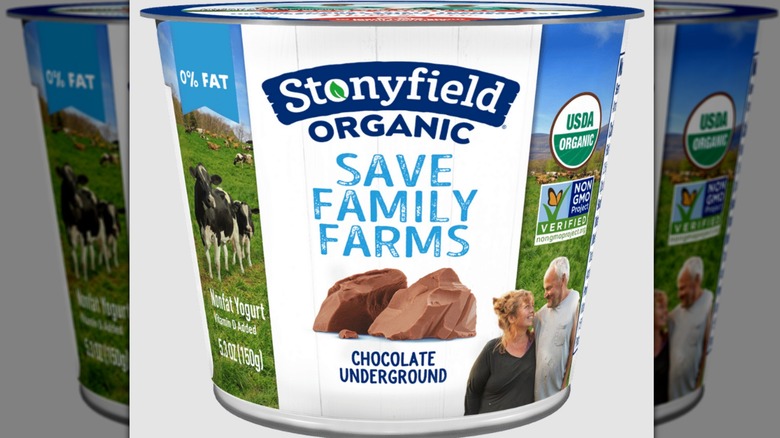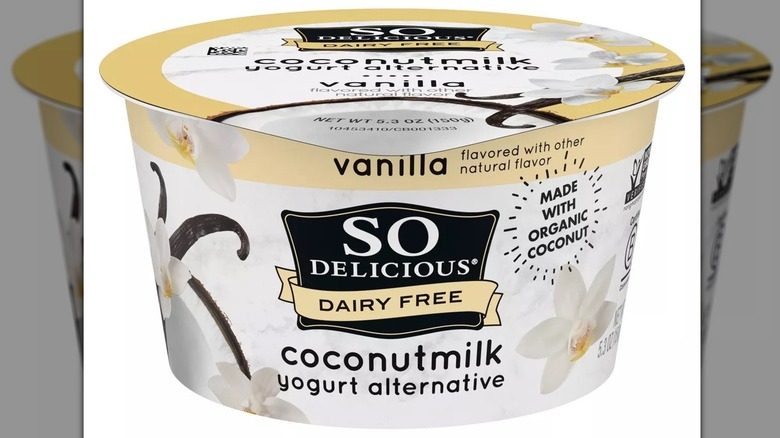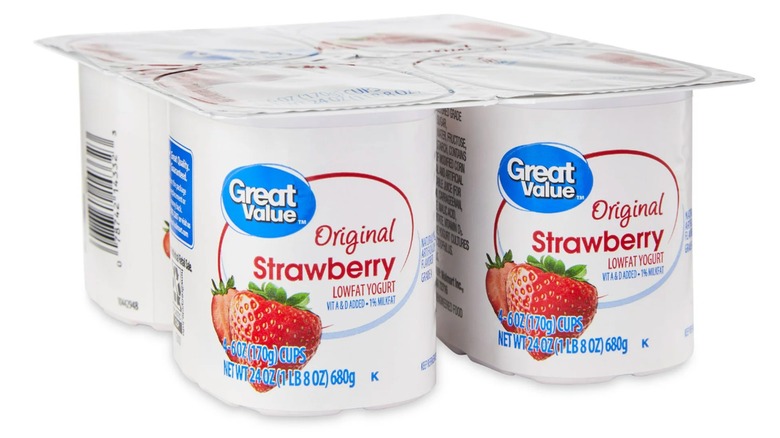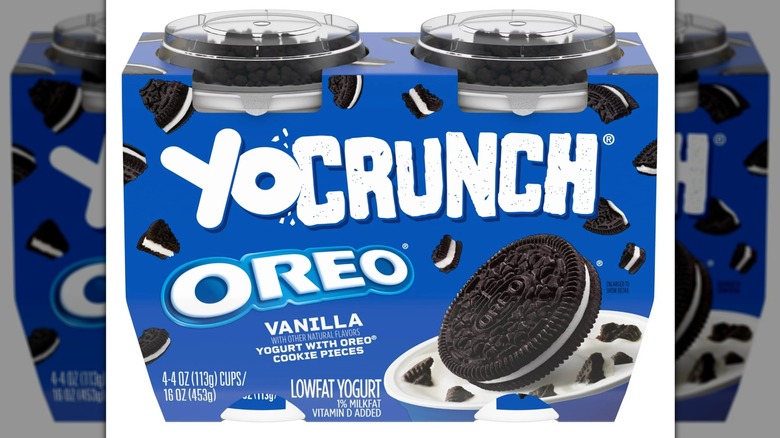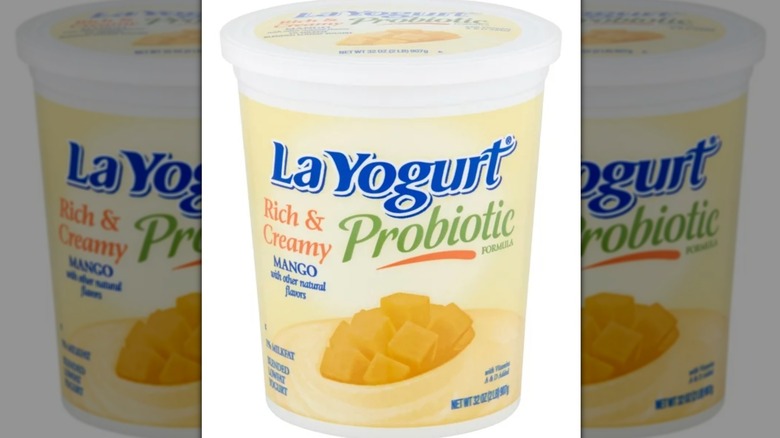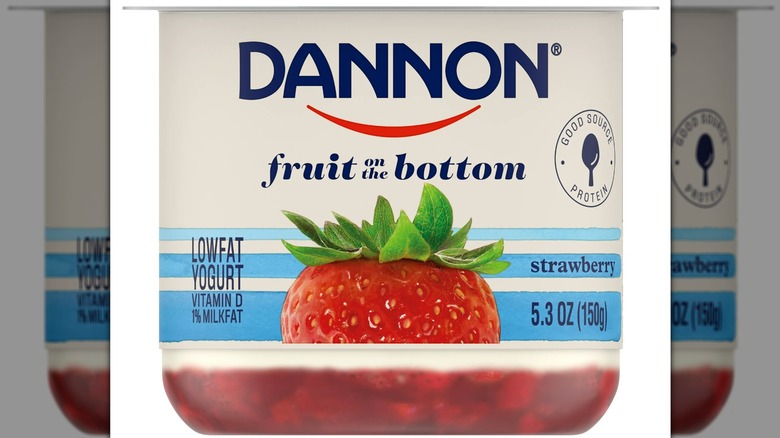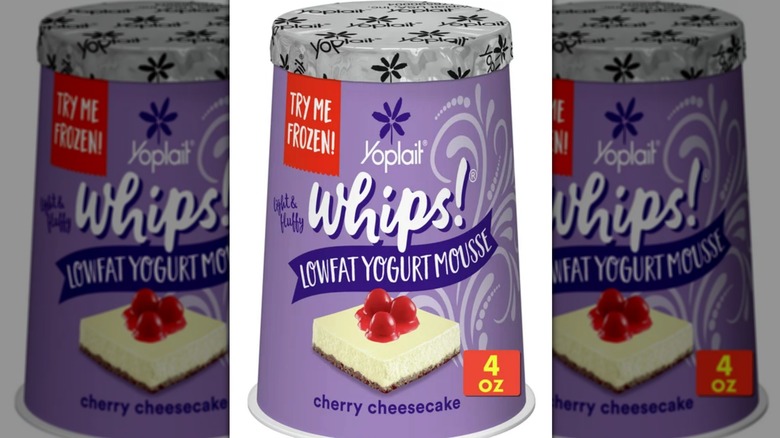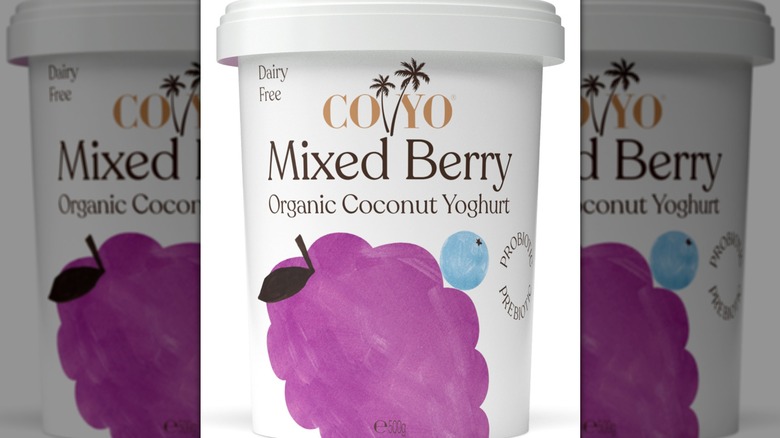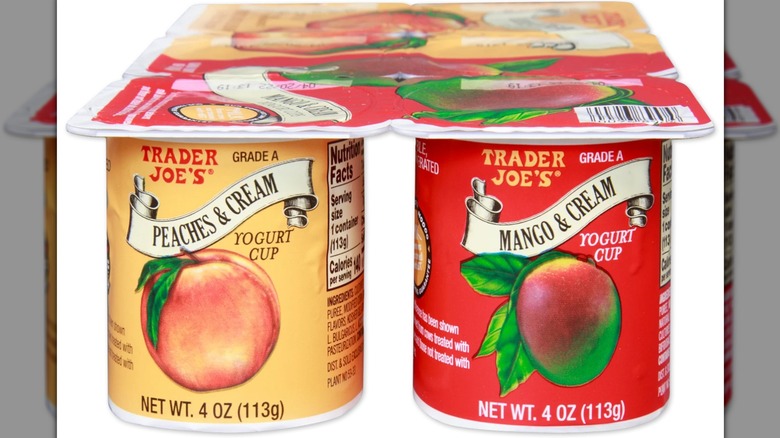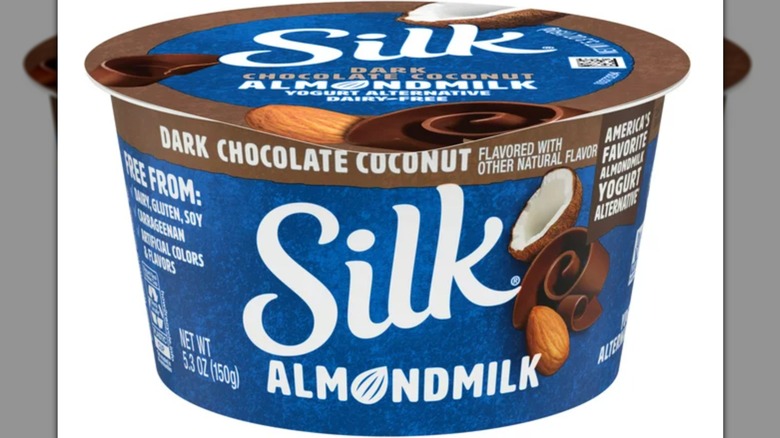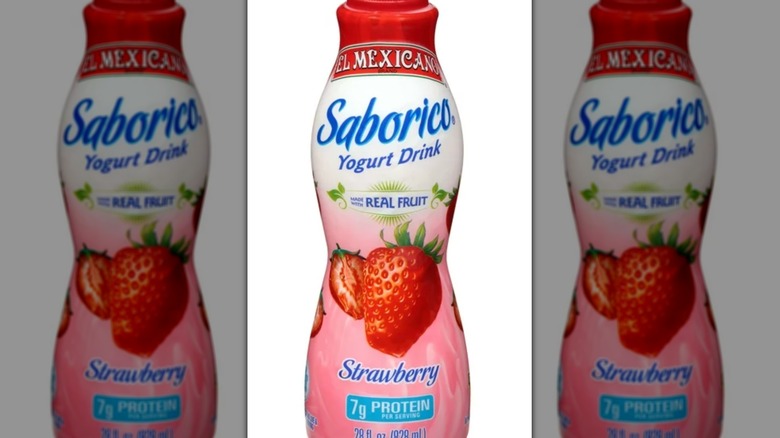13 Of The Unhealthiest Store-Bought Yogurt Brands
We may receive a commission on purchases made from links.
Ask pretty much anyone to name the healthiest foods they can think of, and yogurt will likely be one of them. Yogurt is a nutritional powerhouse that's packed with important vitamins and minerals, according to Healthline. As well as containing approximately half of your daily value for calcium in one cup, it's also high in minerals like magnesium, potassium, and phosphorus and vitamins like B12 and D.
Certain types of yogurt are also packed with all-important probiotics, supplying your gut with vital bacteria that help keep your digestive system in good order and your immune system in good shape, according to research published in Current Opinion in Food Science. Yogurt is also high in protein, making it a valuable dietary source for meat-eaters and non-meat-eaters.
Did we mention that it's delicious? Yogurt has a creamy, slightly sour flavor, which works well on its own and alongside other flavors. This versatility as a flavor base, however, has led to its increased popularity as a food product. Nowadays, there are yogurts infused with every kind of taste you can think of. Unfortunately, many of these brands — in their desire to make yogurt as tasty as possible — also end up making the yogurt incredibly unhealthy by adding sugars or other additives. So, which yogurt brands are the worst? We've got them right here.
1. The Greek Gods
Of all the types of yogurt out there, Greek yogurt is by far one of the healthiest and most delicious. It contains high levels of protein and live bacteria. Plus, it's frequently available in low-fat versions. Additionally, it has a thicker consistency, which makes it all the more enjoyable to eat.
Flavored Greek yogurts, however, are a different story — and Seattle-based company The Greek Gods slightly drops the ball with its honey-flavored Greek yogurt. While Greek yogurt naturally contains some sugar, this yogurt has 23 grams in each serving, with 15 grams coming from added sugar. This provides 30% of your daily value of added sugar in a small ⅔ cup serving size.
And while the sugar in this yogurt is listed as coming from cane sugar, you shouldn't let that make you think that it's any healthier. Cane sugar has exactly the same molecular structure as granulated sugar, and granulated sugar often comes from cane sugar. As such, it has all the same impacts on health that your regular white sugar would have, like an impact on your blood pressure and an increased risk to your cardiovascular health, per WebMD.
2. Stonyfield Organic
Regular whole-milk yogurt can put some people off because of its fat content. While nonfat yogurts are widespread, it's still important to check the nutrition labels of some of these products. Stonyfield's Organic Chocolate Underground Nonfat Yogurt Cups are a good example of where nonfat yogurt can go badly.
Stonyfield uses a large amount of added sugar to add flavor to these cups, with 13 grams per 150-gram tub (roughly 26% of your daily value for added sugars). This means that Stonyfield is essentially adding back the calories that are reduced from it being a nonfat yogurt.
Choosing a nonfat yogurt may not always be the smartest move. "Although in general, it's best to opt for the no-fat variety, choosing a low-fat option can increase satiety and result in less overeating at future meals, ultimately being a better option for weight loss," Registered Dietitian Bonnie Balk told Eat This, Not That. Our body also needs a certain amount of fats to function optimally, helping our bodies process certain vitamins. And it also gives our yogurt an extra-creamy, luxurious texture and a smoother, mellower flavor. You should also make sure you're not choosing a full-fat version with loads of added sugars.
3. So Delicious
So Delicious does its yogurt a little differently. With its range of dairy-free yogurt alternatives made from coconut milk, the food company shows that you don't have to be able to eat dairy to enjoy the creamy dessert. However, you may not enjoy the nutritional profile of its yogurts that much.
The company's Vanilla Coconut Milk Yogurt, for example, contains not only a huge amount of added sugar — with 15 grams in each 150-gram container – but also a high amount of saturated fat. Each yogurt tub provides you with 3.5 grams of saturated fat, nearly a fifth of the maximum amount you should have in a day.
While this is comparable to some other yogurt brands out there — which isn't necessarily a good thing — what really sets So Delicious apart is its product's total lack of protein. While coconut milk does contain a small amount of naturally occurring protein, it doesn't contain as much as cow's milk — and unfortunately, none of it makes its way into this yogurt. This is troublesome, as the protein in regular yogurt doesn't just help to fill you up; it also delivers your body important nutrients that help repair it when it's damaged and builds muscle (per BetterHealth). With this yogurt, though, you'll get none of those benefits.
4. Great Value
For many people, yogurt is an essential fridge item due to a combination of its deliciousness, nutritiousness, and relative cheapness. As such, it's hardly any surprise that the king of all supermarkets, Walmart, has a range of affordable yogurts in its Great Value line.
With these yogurts, however, you get what you pay for, as they're far from the most natural product. The Great Value Original Strawberry Lowfat Yogurt is full of added sugar, and each container has almost a third of your daily value, with 16 grams of added sugar per 170 grams. It also has a lengthy list of additives containing fructose, modified food starch, carrageenan, and gelatin.
These last three items are presumably all added to thicken the yogurt and give it a smoother texture, but some of them should give you pause. Carrageenan, for example, has been subject to a great deal of discussion about its potential health effects. Gelatin is made from processed animal parts, which makes it unsuitable for vegetarians and vegans. Walmart's Great Value yogurt also lists having "artificial flavors" included in its recipe, but there's little indication about what these flavors are or what they're made from.
5. YoCrunch
There's no denying that YoCrunch yogurts are fun. Each of its yogurts comes with its own topping cup, which, when sprinkled onto the flavored yogurt, creates a texture combination that makes eating this dessert an event. But all that joy comes at a cost, as YoCrunch's yogurts are full of sugar.
Its Oreo flavor has 21 grams of sugar per serving, inclusive of toppings, with 11 of these grams being added to a relatively small serving size of 113 grams. Without the toppings, this yogurt fares slightly better, with just 8 grams of added sugar — but let's be honest, you're not going to leave those out of the dessert, are you?
There are also just 3 grams of protein in each yogurt pot, and no fiber anywhere to be seen. The added sugar content is especially troublesome, considering that YoCrunch yogurts are quite clearly marketed towards kids. Everyone knows that giving kids excess sugar leads to some seriously up-and-down emotions, but it can also lead to all of the health issues associated with high sugar intake in adults, like metabolic disease, high blood pressure, and type 2 diabetes (per UT Southwestern Medical Center). Ideally, children under 18 should eat no more than 25 grams of added sugar per day — and this yogurt supplies almost half of this amount.
6. La Yogurt
La Yogurt's products have some benefits going for them, including the fact that they contain probiotics, are flavored with natural additives, and are reasonably priced. But they also have some serious downsides, and one of them is sugar content.
"Many of the yogurts and yogurt drinks marketed toward the Hispanic population are among the worst you can find on store shelves," Sharon Puello, a registered dietitian and certified dietitian nutritionist, told Eat This, Not That. "Terribly high in added sugars and low in protein, La Yogurt carries some of the highest amounts of added sugars across its flavors."
Puello goes on to point out that its Blended Mango flavor is abundant in sugar, with 18 grams of added sugar in every 170-gram serving size. This is well over a third of your daily value. The amount of sugar is especially troublesome as a proportion of it appears to come from fructose. Fructose is a type of sugar that has been found to have a negative impact on the liver in high quantities, as research published in Diabetes, Metabolic Syndrome and Obesity shows. La Yogurt's Blended Mango flavor also contains gelatin, which could be useful to note if you're following a plant-based diet.
7. Dannon
Dannon has been around since 1942, and over the decades, it's become many people's go-to choice for yogurt. With understated branding that puts vibrant images of fresh fruit front and center, Dannon's fruit-flavored products, particularly its Fruit On The Bottom range, seem to be the picture of health. These small pots, however, are incredibly high in sugar, with 21 grams total and 15 grams of added sugar in each 150-gram container of its strawberry flavor. Each pot also only provides 5 grams of protein, making it a fairly low-protein choice. For comparison's sake, one cup of plain Greek yogurt provides 19 grams of the nutrient.
There are also quite a few additives in Dannon's Fruit On The Bottom yogurts, which you might want to avoid. As well as gelatin, its strawberry yogurt contains modified food starch, carrageenan, and disodium phosphate. This last ingredient is a common food additive frequently found in processed food products. While it is generally regarded as safe, research has pointed toward the potential risks associated with phosphate additive consumption, most notably a strain on the kidneys and a higher risk of chronic kidney disease, according to Deutsches Ärzteblatt International.
8. Yoplait
As anyone who's tried frozen yogurt before will tell you, yogurt can be an excellent replacement for cream in a dessert, thanks to its smoothness and neutral dairy flavor. But whether a yogurt-based dessert is healthy or not is based largely on what else is added to it. This is where the mega-popular international brand Yoplait goes wrong. Some of its dessert-like yogurt flavors, like its Yoplait Whips line, are crammed with sugar. Its Cherry Cheesecake flavor contains 18 grams of added sugar in each tub, over a third of your recommended daily value, and 22 grams of sugar overall.
This is particularly notable, as Yoplait Whips seem to have the appearance of healthiness, with a whipped, light texture and "low-fat" displayed prominently on its packaging. Despite this, Yoplait Whips actually have a pretty surprising amount of saturated fat in them, with 1.5 grams per serving, roughly 8% of your daily recommended amount. Crucially, too, the serving size for each of these yogurts is small. While most yogurt tubs weigh in at 170 grams, each Yoplait Whips tub is just 4 ounces, meaning you're getting a pretty large amount of sugar and calories (with 140 per pot) relative to its size.
9. COYO
Switching to a plant-based diet can come with a host of health benefits, but not all plant-based products are nutritious. COYO yogurts are a testament to this. The Australian company was founded partly with a mission to offer dairy-free dessert alternatives to individuals who can't consume it due to allergies or intolerances. But in the pursuit of this, it's created yogurt alternative products that are bafflingly high in saturated fat.
In just one 170-gram serving of COYO's Mixed Berry flavor, there are 31 grams of saturated fat — around 155% of the maximum amount you should be eating each day. Saturated fats make up the vast majority of its fat content, which is 33 grams in total. The yogurt alternative also contains barely any protein — just 3 grams per serving. It also has 10 grams of carbs and 8 grams of sugar per 170 grams, which might make it tricky to eat as part of a keto diet.
Importantly, COYO doesn't shy away from the fact that it offers products that promise "dietary decadence" (per its website), so the nutritional information of its items isn't exactly a secret. But it's crucial to remember that just because something is plant-based, it doesn't mean that it's automatically healthier. The saturated fat content in this yogurt alternative is way higher than the dairy-based options out there, and eating large amounts of saturated fat regularly could cause a rise in your cholesterol levels, according to the NHS.
10. Noosa
Noosa prides itself on the taste of its products, and since 2004, it's been churning out (get it?) yogurts that contain real fruit and big flavor. But all that flavor has to come from somewhere, and sadly, a lot of it is down to sugar. Its Raspberry Yogurt product has 17 grams of added sugar in its 8-ounce tubs, approximately 34% of your daily value. Curiously and rather worryingly, there are also 13 grams of sugar elsewhere in the yogurt, meaning that each tub has a whopping 30 grams in total.
Noosa's Raspberry Yogurt isn't low-fat, either, and as well as the high sugar content, it also has a hefty amount of saturated fats. With 7 grams in every tub, each yogurt will deliver 35% of the maximum amount suggested every day. All of this adds up to a dessert that is pretty high in calories, providing 260 calories per eight ounces. As most women between 21-50 require between 1800-2000 calories each day (if following a sedentary lifestyle), this amount could take up a fairly large proportion of your daily allowance, with much of it coming from sugar and fat.
11. Trader Joe's
Trader Joe's has a knack for making its products look good, and its yogurt cups are no exception. Each of its Peaches & Cream and Mango & Cream Yogurt Cups is a vision, with bright packaging covered in illustrated fruit and gentle pastel-colored yogurt inside. Its nutrition info is less attractive, however, and every one of these yogurt cups has a high 13 grams of added sugar. That's over a quarter of the amount of added sugars you should be having per day — and bear in mind that this is in a small serving size, with every pot weighing in at just 113 grams.
These yogurt cups are also high in saturated fat, and each small cup has 3.5 grams, around 18% of your suggested daily allowance. There are only 4 grams of protein per serving, and unlike other yogurt products on the market, they don't appear to be fortified and are somewhat lacking in vitamins and minerals. Trader Joe's yogurt cups also use several additional ingredients to increase their smoothness, with modified cornstarch, whey protein concentrate, and gelatin included in every tub.
12. Silk
Almond milk has a lot going for it nutritionally. As a low-calorie dairy alternative, it's low in sugar when unsweetened. It is usually fortified to add extra nutrients like calcium and vitamin D. This, combined with its gentle flavor, makes it a logical choice for a healthy yogurt alternative. However, plant-based food company Silk somewhat drops the ball with its almond milk yogurts, which are a high-sugar, low-protein proposition.
Its Dark Chocolate Coconut flavor has 16 grams of sugar, all of which are added to the product. As well as this, it only has 5 grams of protein in each serving. The protein content shouldn't be too surprising, given that almond milk is naturally low in protein, but it's still worth bearing in mind that you won't get nearly as much protein as you would with regular Greek yogurt.
Importantly, however, Silk does have some benefits that you might not see in other plant-based yogurt alternatives. It has 3 grams of fiber in every cup, its ingredients list is both short and composed of recognizable ingredients — and like regular almond milk, it contains added vitamin D and calcium. That added sugar content might just put you off, though.
13. El Mexicano Saborico
El Mexicano is a modern-day success story. Starting in 1981 as a small-scale outfit, the brand has become a regular fixture in the Hispanic community in the United States and boasts a huge range of dairy-based products. This includes El Mexicano Saborico, its line of yogurt drinks, each of which is made with real fruit and contains probiotics.
What they also contain, however, is a lot of sugar. Each serving of its strawberry flavor, which comes in a small 207-milliliter bottle, has 20 grams of added sugar. This is approximately 40% of the maximum amount advised daily, going down in just a few gulps. There are also 4 grams of saturated fat in each small serving.
As well as this, El Mexicano Saborico's strawberry flavor has several ingredients that give us pause. As well as the rather vague-sounding "artificial flavors" in each bottle, there are also the food colorings Red 40 and Blue 1. Both of these colorings have the potential to prompt an allergic reaction in some individuals, according to Healthline. Red 40 has also had a lot of scrutiny due to its connection with causing hyperactivity in young children (via Medical News Today).
